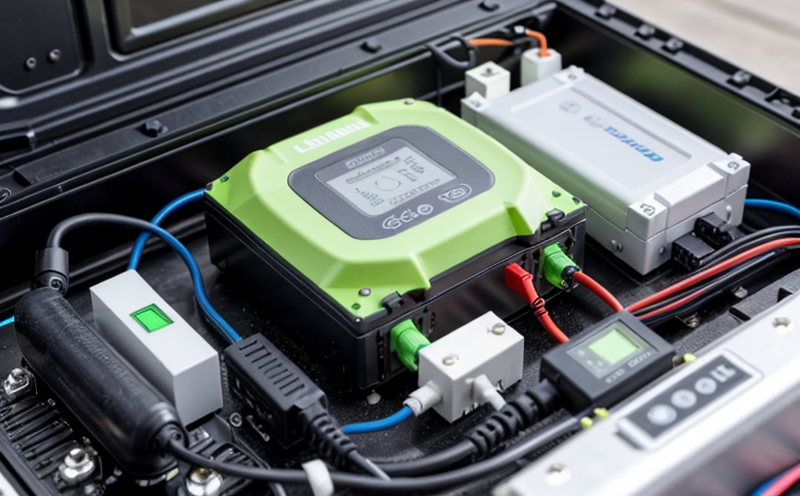BS EN 62620 Lithium-Ion Battery Testing for Large Cells and Systems
The BS EN 62620 standard is a comprehensive guide designed to ensure the safety, performance, and reliability of large-format lithium-ion batteries used in various applications such as electric vehicles, renewable energy storage systems, and industrial power supplies. This standard covers the testing procedures for large cells and battery systems, focusing on ensuring compliance with international standards that prioritize safety and quality.
The scope of BS EN 62620 includes large-format lithium-ion batteries defined by the European Committee for Standardization (CEN) as those exceeding a certain energy content. This standard provides a structured approach to testing, which is essential for manufacturers, quality managers, compliance officers, R&D engineers, and procurement specialists involved in the development and production of these batteries.
The testing procedures outlined in BS EN 62620 are designed to evaluate the safety, performance, and reliability of large lithium-ion cells and systems. Key areas covered include mechanical tests, electrical tests, thermal tests, and abuse tests. These tests are conducted to ensure that the battery can withstand various stress conditions while maintaining its integrity and functionality.
The standard specifies detailed procedures for each test, including specimen preparation, equipment requirements, and expected outcomes. For instance, in mechanical tests, the batteries undergo compression, vibration, and impact testing to assess their structural robustness. Electrical tests focus on measuring internal resistance, voltage, and current under different conditions. Thermal tests evaluate how well the battery performs under high-temperature environments, while abuse tests simulate real-world scenarios such as overcharging or short-circuiting.
Compliance with BS EN 62620 is crucial for manufacturers aiming to meet regulatory requirements and ensure product safety. Non-compliance can lead to product recalls, legal issues, and damage to the company's reputation. By adhering to this standard, manufacturers can demonstrate their commitment to quality and safety, thereby gaining a competitive edge in the market.
The testing procedures outlined in BS EN 62620 are not only essential for ensuring the safety of end-users but also contribute significantly to environmental sustainability. By improving battery performance and reliability, these tests help reduce waste and extend the lifecycle of batteries, leading to less frequent replacements and lower environmental impact.
Applied Standards
The BS EN 62620 Lithium-Ion Battery Testing standard is closely aligned with other international standards such as ISO/IEC 13439-1, IEC 62685, and ASTM G28. These standards provide additional guidance on specific aspects of battery testing, complementing the comprehensive approach offered by BS EN 62620.
ISO/IEC 13439-1 focuses on the determination of internal resistance in rechargeable lithium-ion cells, which is crucial for understanding the health and performance of batteries. IEC 62685 addresses the safety aspects of secondary (rechargeable) batteries, providing additional layers of protection against potential hazards.
ASTM G28 covers the determination of the thermal stability of rechargeable lithium-ion cells, which is essential for ensuring that batteries can withstand high temperatures without degrading or catching fire. By adhering to these standards in conjunction with BS EN 62620, manufacturers and testers can ensure a holistic approach to battery safety and performance.
Benefits
The implementation of BS EN 62620 Lithium-Ion Battery Testing brings numerous benefits to manufacturers, quality managers, compliance officers, R&D engineers, and procurement specialists involved in the development and production of large-format lithium-ion batteries.
- Enhanced Safety: Compliance with this standard ensures that batteries meet strict safety requirements, reducing the risk of accidents and injuries. This is particularly important for applications involving high-power or high-energy batteries used in electric vehicles and renewable energy storage systems.
- Improved Quality Control: By following the detailed procedures outlined in BS EN 62620, manufacturers can implement robust quality control measures that ensure consistent product performance. This leads to higher customer satisfaction and a better reputation in the market.
- Regulatory Compliance: Adhering to this standard helps manufacturers meet regulatory requirements, thereby avoiding potential legal issues and fines. This is especially important for companies operating in regions with strict environmental and safety regulations.
- Innovation and Development: The comprehensive testing procedures outlined in BS EN 62620 encourage continuous improvement and innovation in battery technology. By identifying areas for enhancement, manufacturers can develop more efficient and reliable batteries, which is crucial for the advancement of sustainable energy solutions.
The benefits extend beyond individual manufacturers to positively impact the entire industry. By setting a high standard for safety and performance, BS EN 62620 contributes to the overall reliability and trustworthiness of lithium-ion batteries in various applications.
Environmental and Sustainability Contributions
The implementation of BS EN 62620 Lithium-Ion Battery Testing plays a crucial role in promoting environmental sustainability. By ensuring that large-format lithium-ion batteries are safe, reliable, and perform optimally under various conditions, this standard helps reduce waste and extend the lifecycle of these batteries.
Extended battery life reduces the frequency of replacements, leading to fewer resources being consumed in manufacturing new batteries. This not only saves energy but also decreases the environmental impact associated with mining raw materials and producing new products. By encouraging the reuse and recycling of batteries, BS EN 62620 supports a circular economy model that is essential for sustainable development.
Moreover, the testing procedures outlined in this standard help manufacturers identify areas where they can improve battery performance, efficiency, and durability. This leads to the development of more advanced and environmentally friendly technologies, contributing to the global effort to combat climate change and promote sustainability.
The environmental benefits of BS EN 62620 Lithium-Ion Battery Testing are particularly significant for applications involving electric vehicles (EVs) and renewable energy storage systems. These sectors are critical in the transition towards a low-carbon economy, and ensuring the safety and reliability of batteries is essential for their widespread adoption.





